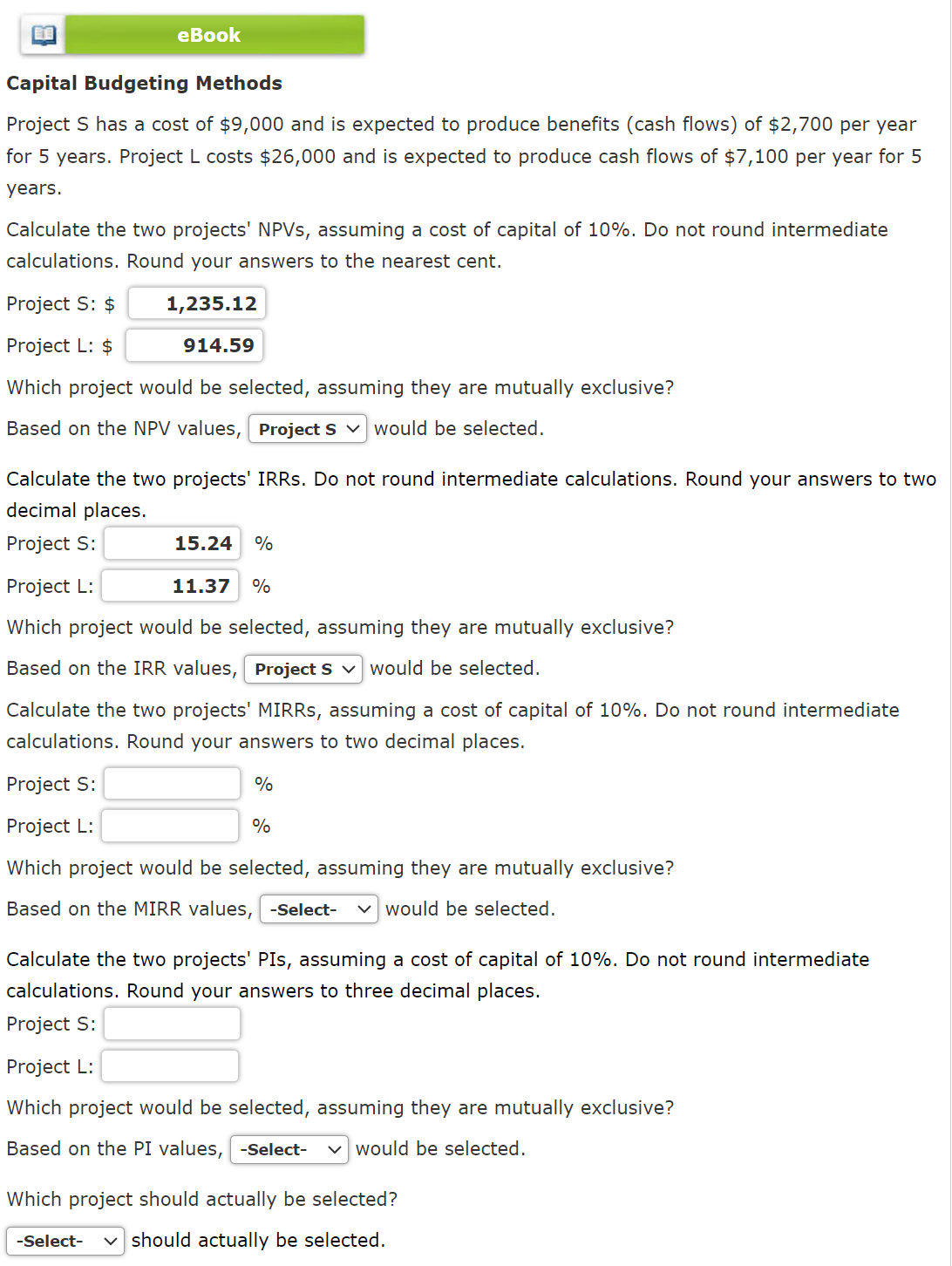Answered step by step
Verified Expert Solution
Question
1 Approved Answer
Capital Budgeting Methods Project S has a cost of $9,000 and is expected to produce benefits (cash flows) of $2,700 per year for 5 years.
 Capital Budgeting Methods Project S has a cost of $9,000 and is expected to produce benefits (cash flows) of $2,700 per year for 5 years. Project L costs $26,000 and is expected to produce cash flows of $7,100 per year for 5 years. Calculate the two projects' NPVs, assuming a cost of capital of 10%. Do not round intermediate calculations. Round your answers to the nearest cent. Project S: \$ Project L: \$ Which project would be selected, assuming they are mutually exclusive? Based on the NPV values, would be selected. Calculate the two projects' IRRs. Do not round intermediate calculations. Round your answers to two decimal places. Project S: % Project L: % Which project would be selected, assuming they are mutually exclusive? Based on the IRR values, would be selected. Calculate the two projects' MIRRs, assuming a cost of capital of 10%. Do not round intermediate calculations. Round your answers to two decimal places. Project S: % Project L: % Which project would be selected, assuming they are mutually exclusive? Based on the MIRR values, would be selected. Calculate the two projects' PIs, assuming a cost of capital of 10%. Do not round intermediate calculations. Round your answers to three decimal places. Project S: Project L: Which project would be selected, assuming they are mutually exclusive? Based on the PI values, would be selected. Which project should actually be selected? should actually be selected
Capital Budgeting Methods Project S has a cost of $9,000 and is expected to produce benefits (cash flows) of $2,700 per year for 5 years. Project L costs $26,000 and is expected to produce cash flows of $7,100 per year for 5 years. Calculate the two projects' NPVs, assuming a cost of capital of 10%. Do not round intermediate calculations. Round your answers to the nearest cent. Project S: \$ Project L: \$ Which project would be selected, assuming they are mutually exclusive? Based on the NPV values, would be selected. Calculate the two projects' IRRs. Do not round intermediate calculations. Round your answers to two decimal places. Project S: % Project L: % Which project would be selected, assuming they are mutually exclusive? Based on the IRR values, would be selected. Calculate the two projects' MIRRs, assuming a cost of capital of 10%. Do not round intermediate calculations. Round your answers to two decimal places. Project S: % Project L: % Which project would be selected, assuming they are mutually exclusive? Based on the MIRR values, would be selected. Calculate the two projects' PIs, assuming a cost of capital of 10%. Do not round intermediate calculations. Round your answers to three decimal places. Project S: Project L: Which project would be selected, assuming they are mutually exclusive? Based on the PI values, would be selected. Which project should actually be selected? should actually be selected Step by Step Solution
There are 3 Steps involved in it
Step: 1

Get Instant Access to Expert-Tailored Solutions
See step-by-step solutions with expert insights and AI powered tools for academic success
Step: 2

Step: 3

Ace Your Homework with AI
Get the answers you need in no time with our AI-driven, step-by-step assistance
Get Started


